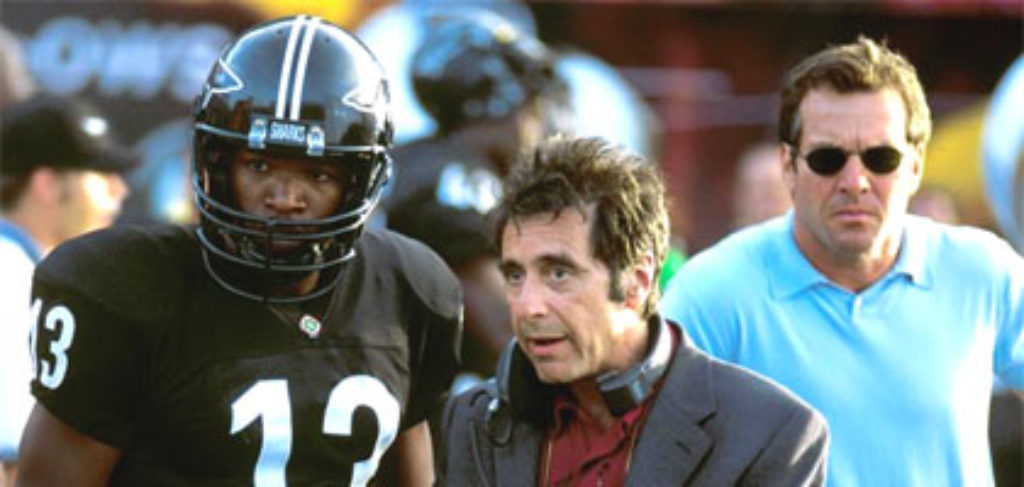
Tony D’Amato is the aging head coach of the Miami Sharks of the fictional AFFA (Associated Football Franchises of America). The team, two-time league champion, is on a losing streak and is suffering sagging attendance and falling revenues. D’Amato is loyal to his old-timers, including 39-year-old quarterback Cap Rooney and defensive captain Shark Lavay. The coach, who came up in the old school of football management where a handshake was sufficient to seal a contract, must now deal with the take-no-prisoners approach to management embodied by the daughter of the team’s founder, Christina Pagniacci. In addition to having to try to meet the demands of the owner, D’Amato must deal with player injuries, a prima donna running back more interested in his stats and bonuses than team unity, and a third-string quarterback who, when suddenly thrust into the limelight, becomes not only the savior of the team’s championship prospects but also a divisive force on and off the field.
Positive Elements: This film is a morality play writ large. For an action movie, it sometimes seems more interested in the broad tapestry of its characters than the action on the field. Everyone has some sort of character flaw, but all the various plot lines work toward the people resolving to better themselves and do the right thing. The cynical team doctor, played by James Woods, believes in winning more than in medical ethics. He’ll prescribe any drug, fudge any medical test, to keep the players on the field. But the idealistic team intern, played by Matthew Modine, stands up for the Hippocratic Oath and succeeds in getting the doctor fired.
Spiritual Content: The team chaplain, while not getting a lot of screen time, is portrayed as a sympathetic character. He gives a locker room sermon straight out of the Bible, and the players kneel to recite the Lord’s Prayer. The young replacement quarterback, an obnoxious character, is frustrated that his mother never attends the games because she saves Sundays for church.
Sexual Content: Coach D’Amato is propositioned by a high-priced prostitute. He turns her down the first time but is shown in bed with her later in the film, with female nudity and implied sex shown. The players are frequently found in the arms of scantily clad females (some of the bathing suits better qualify as dental floss than clothing). Frequent sexual banter and crude jokes. The camera lingers on full frontal male nudity in a locker room scene.
Violent Content: Extreme stylized violence on the field, complete with bone-crunching hits, helmets ripped from heads, and downfield tackles that would knock a water buffalo silly.
Crude or Profane Language: Anyone trying to keep count would die of writer’s cramp within the first half hour of this three-hour curse-fest. It seems every third word in this movie from just about every character is a profanity or crudity. Significantly, the aging quarterback Cap Rooney does not cuss, and his corny euphemisms for standard cuss words stand out like white on black.
Drug and Alcohol Content: Frequent alcohol use at nightclubs and parties. Coach D’Amato always seems to be at a bar drinking whiskey and smoking a cigar. (Don’t most coaches spend their off-hours reviewing game films?) One party scene shows a woman snorting cocaine. The players are frequently seen taking pain killers or being given pain killer shots.
Other Negative Elements: There is frequent trash talk and taunting on the field. There is a just-below-boil element of racial tension in the locker room. The third-string quarterback, suffering a bad case of nerves upon being called suddenly into the game, vomits in the huddle. This becomes a running joke throughout the movie, his vomiting whenever he enters the game. One rap song played loudly during a locker room scene is called “My N-ggers.”
Summary: Oliver Stone has been known to make morality plays before, whether attacking the insanity of the Vietnam War or the naked greed of some Wall Street traders. Here, Stone sets his sights on the win-at-all-costs mentality that has plagued professional sports since probably their beginning. (Stone, never one for subtlety, twice has conversations take place in a room where the chariot race from the 1959 movie Ben-Hur is playing on the TV.) Coach D’Amato, coming to the realization that his life has had the wrong focus, tells a young player, “This game has to be about more than winning.”
While Stone may be a technically brilliant filmmaker, and he may even make astute cultural observations and critiques from time to time, that counts for little as Any Given Sunday blasts moviegoers with a constant stream of profanity, full nudity and gratuitous sex scenes. Bypass the theater and crawl through the sewer, you’ll come out cleaner.
